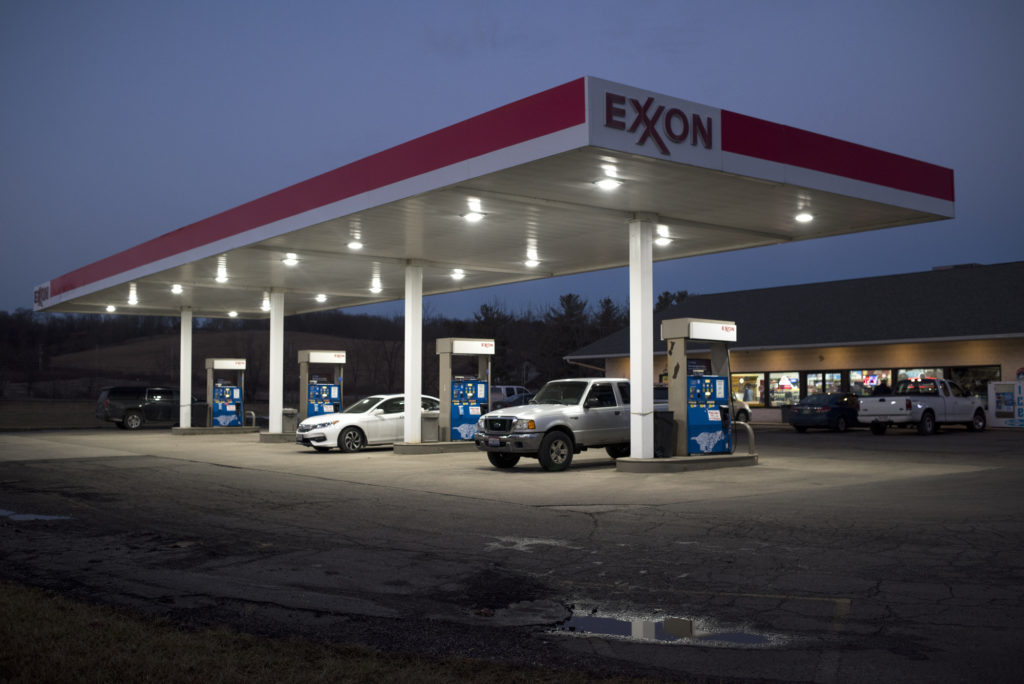
As climate-change lawsuits against the oil industry mount, Exxon Mobil Corp. is taking a bare-knuckle approach rarely seen in legal disputes: It’s going after the lawyers who are suing it.
The company has targeted at least 30 people and organizations, including the attorneys general of New York and Massachusetts, hitting them with suits, threats of suits or demands for sworn depositions. The company claims the lawyers, public officials and environmental activists are “conspiring” against it in a coordinated legal and public relations campaign.
Exxon has even given that campaign a vaguely sinister-sounding name: “The La Jolla playbook.” According to the company, about two dozen people hatched a strategy against it at a meeting six years ago in an oceanfront cottage in La Jolla, Calif.
“It’s an aggressive move,” said Howard Erichson, an expert in complex litigation and a professor at Fordham University School of Law in New York. “Does Exxon really need these depositions or is Exxon seeking the depositions to harass mayors and city attorneys into dropping their lawsuits?”
At Stake
Experts say Exxon’s combative strategy — an extraordinary gambit to turn the tables — is a clear sign of what’s at stake for the fossil-fuel industry. So far, New York City and eight California cities and counties, including San Francisco and Oakland, have sued Exxon and other oil and gas companies. They allege that oil companies denied findings of climate-change scientists despite knowing that the use of fossil fuels posed “grave risk” to the planet.
Attorneys general Eric Schneiderman of New York and Maura Healey of Massachusetts, are investigating whether Exxon covered up information on climate change, defrauding shareholders and consumers.
Exxon, the world’s 10th biggest company, has denied the allegations and says its defense is intended to show that it’s being punished for not toeing the line on climate change, even though it agrees with the scientific consensus.
“The attorneys general have violated Exxon Mobil’s right to participate in the national conversation about how to address the risks presented by climate change,” said Dan Toal, a lawyer who represents Exxon. “That is the speech at issue here — not some straw man argument about whether climate change is real.”
‘Scare Tactic’
Plaintiff lawyers and legal experts contend the oil giant’s tactics are meant to intimidate while shifting the spotlight away from claims of environmental damage. And they say there’s nothing improper with lawyers discussing legal strategies together.
“It’s crazy that people are subpoenaed for attending a meeting,” said Sharon Eubanks, a lawyer who was at the La Jolla gathering. “It’s sort of like a big scare tactic: reframe the debate, use it as a diversionary tactic and scare the heck out of everybody.”
Exxon has focused on the La Jolla meeting as ground zero for its conspiracy claim. Ironically, the Rockefeller Brothers Fund, a nonprofit run by descendants of John D. Rockefeller who are pressing Exxon to address climate change issues, has funded organizations that led the La Jolla conference (Exxon, which grew out of John D.’s Standard Oil, also subpoenaed the fund to testify.)
At the gathering, participants met to discuss litigation strategies that could be applied to climate change, according to a 35-page summary that was later made public. Eubanks, a former Justice Department lawyer, talked about how the U.S. government used the racketeering law against cigarette makers, for example.
More than four years after the meeting, Eubanks got a subpoena from Exxon to testify about it. The subpoena is pending.
Document Request
Exxon has also aimed its legal firepower at Matthew Pawa, whose firm represents Oakland, San Francisco and New York in their suits against Exxon. Last month, Exxon asked a state judge in Fort Worth, Texas, to order Pawa to turn over documents and testify under oath about the La Jolla conference and other conversations with lawyers and activists. He’s also been subpoenaed to testify in a federal action Exxon has brought against the state attorneys general.
Pawa declined to comment.
The company is also seeking testimony from 15 municipal lawyers and officials in California. Exxon said it’s seeking evidence for “an anticipated suit” claiming civil conspiracy and violation of its First Amendment and other Constitutional rights.
Routine Meetings
Experts in litigation say that lawyers in big lawsuits, including those targeting tobacco, guns and pharmaceuticals, routinely meet to share information and coordinate strategy.
“I don’t think there’s anything wrong with plaintiffs’ lawyers and attorneys general strategizing together,” said Fordham professor Erichson, ”just as I don’t think there’s anything wrong with lawyers for oil companies strategizing together.”
But Linda Kelly, general counsel of the National Association of Manufacturers, said the climate litigation is really a play for money and votes.
“It’s a coming together of plaintiffs’ lawyers who have a profit motive and a liability theory, environmental activists who have a political agenda and politicians who are looking to make a name for themselves with this issue,” Kelly said.
Contingent Fees
San Francisco has promised 23.5 percent of any settlement to its lawyers. New York is working on a contingent-fee deal like San Francisco’s, according to a spokesman for the city’s Law Department.
In recent years, the most notable attack on a plaintiff lawyer came in 2011 when Chevron Corp., claiming it was target of an extortion scheme, successfully pursued a civil racketeering suit against Steven Donziger, the attorney behind a $9.5 billion Ecuadorian judgment against the company over pollution in the Amazon.
Some experts say Exxon’s strategy goes beyond mere litigation tactics.
“People often try to use litigation to change the cultural conversation,” said Alexandra Lahav, a professor at the University of Connecticut School of Law, pointing to litigation over guns and gay rights as examples. “Exxon is positioning itself as a victim rather than a perpetrator.”
Recommended for you
